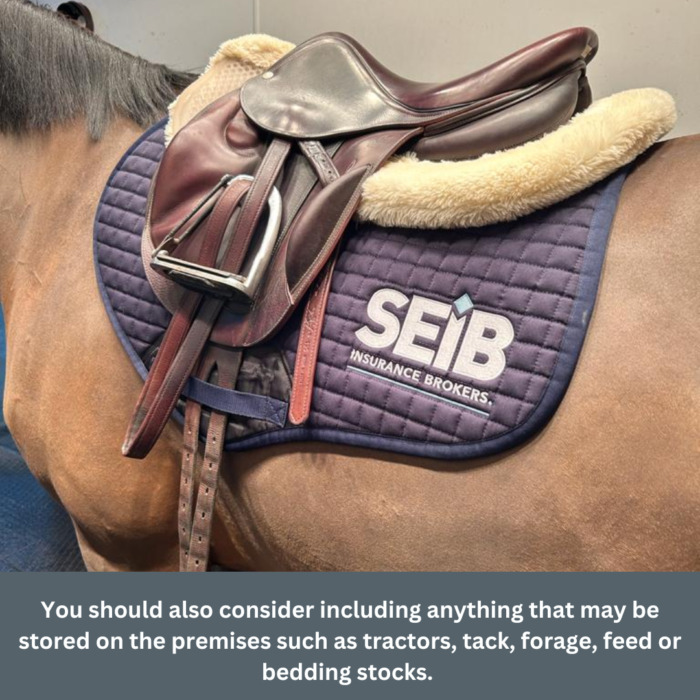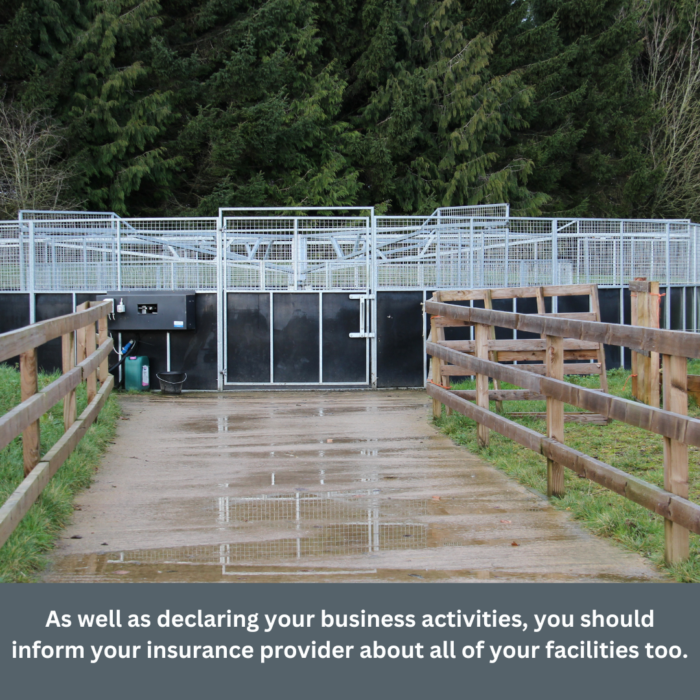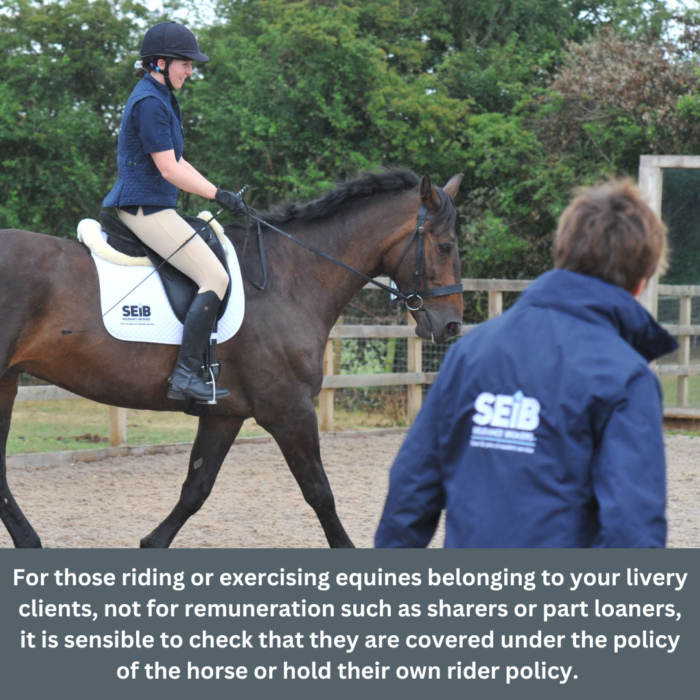Livery Yard Insurance can be a complicated aspect of running a livery yard with several insurance areas to consider. As a yard owner, if a horse, client, visitor, or employee is injured on your yard, you could be deemed liable. Many yard owners hold some form of insurance for their business, but do they hold the right type of insurance, and do they have the right sort of cover for their yard’s needs?
We've teamed up with Cheryl Johns, the founder of LiveryList to bring you this blog. Launched in 2011, LiveryList has been the top-ranked Livery Yard Directory for many years, and through the Yard Owner Hub, launched in 2020, has developed into a one-of-a-kind resource for yard owners.
Start with the basics
As a livery yard, whether you offer grass livery, full livery, or anything in between, you should have a public liability policy in place. This is not a legal requirement but will help protect against claims of negligence against the yard owner in the event of damage, loss, or injury to any parties - human or equine - on the premises or affected by its activities and will also cover any associated legal fees. Even if all horses on your yard are insured for liability, if something happens that could be deemed your fault, or due to your negligence, then those affected may want to make a claim against you for their losses and in the absence of adequate insurance you could be found personally liable.
If you own your yard, then you may also wish to consider if an appropriate Buildings and Contents policy is in place for the premises and facilities. In the event of damage or losses, this will help cover the cost of repairs. You should also consider including anything that may be stored on the premises such as tractors, tack, forage, feed or bedding stocks. If you rent the yard then you need to be clear whose responsibility it is to insure the premises or its contents, and to ensure the landlord is correctly insured for a commercial lease or tenancy agreement. Usually, a commercial tenant is not required to arrange their own buildings insurance policy, this should be the responsibility of the landlord/ property owner.

If you rent or sub-let a block of stables or section of your yard to a third party - either on a personal or commercial basis - you should also check with your insurance provider that the rental arrangement is covered suitably, and that the tenant holds their own insurance for the activities they intend to provide.
Ensuring your services and facilities are covered
Your insurance policy should suitably cover the services that you offer on your yard. This may not only be the need for liability insurance, but the need for Care, Custody and Control (CCC) insurance which can cover injury or death of a horse in your care, where you’re liable. It is advised even to take this if you own or manage a DIY livery yard, as there may still be occurrences where you could be found liable in the event of injury or loss to an equine on your yard through the livery arrangements you provide. If you make any changes to the type of livery services you offer, you should contact your livery yard insurance provider to keep them updated and ensure your policy is still correct.
As well as declaring your business activities, you should inform your insurance provider about all of your facilities too. If you upgrade or add to your facilities at any time, you should contact them to make sure they are still covered under your existing policy as some may require adjustment to your cover. Some facilities are considered a higher risk than others - such as cross-country courses – particularly if you plan to hire them out. Another consideration is if you allow the storage of horse trailers and horseboxes on your premises, and any restrictions or requirements your insurer may have for them to be covered on your policy.

Insurance for the equines on your yard
Whilst covered to an extent under your livery yard insurance policy, you should ideally require your livery clients to hold public liability insurance. Whilst not obligatory, this would make good business sense for all equines to be covered in case they cause damage or injury to the premises, people, or other equines on the yard. It is not unreasonable to make public liability insurance an obligatory requirement, and to ask your owners for copies of their policies.
It is also an idea to make sure that any tack and equipment belonging to your clients is appropriately insured, and that they consider if the security or provisions for storage meets the needs of their insurance policy in terms of locks and access.
As a note, with the increasing value of horses and ponies, you should check any limits that may be in place with the value of any equines on theirs and your policies to ensure with current market values they are not excluded due to increased values.
Insurance for visitors to your yard
Your public liability would cover anyone on the premises, although it is an idea to make sure certain parties hold their own insurance. For those riding or exercising equines belonging to your livery clients, not for remuneration such as sharers or part loaners, it is sensible to check that they are covered under the policy of the horse or hold their own rider policy.
If anyone is carrying out services on your yard, be it for yourself or for a client, then you should make sure they are appropriately insured for the services they are carrying out, and that they hold professional insurance, such as a groom insurance policy or riding instructor policy. This could be freelance grooms, equine therapists, dental technicians, trainers or the like. It is an idea to request a copy of the insurance in advance for anyone intending to carry out services on your premises and, if felt necessary, check their qualifications too. You should also ensure that the public liability insurance of those providing services matches or exceeds the yards limit of indemnity, otherwise the yard may still be found responsible should a claim exceed the service providers limits.

Responsibility for insuring your staff
Many yard owners believe that if they are using freelance staff, they do not need employers’ liability insurance, but this is often incorrect. When you employ someone - be this freelance or employed - you still hold an obligation to check they are insured appropriately. Even with subcontracted staff and volunteers, in the eyes of the law if they are working under your instruction and using your equipment then you are deemed as their employer and should have an employers’ liability policy in place.
If someone working for you is injured, they could make a claim against you. If you are inadequately insured this could not only be costly if you are found personally liable, but you could also face criminal prosecution. Holding correct employers’ liability insurance means you are meeting your legal obligations, have peace of mind that anyone working on the yard is appropriately covered and you will have the support of your insurer in the event of a claim.
Business interruptions
Many yard owners overlook what might happen, and how they would cope financially, if the worst should happen with the yard which may render them unable to provide services. There are multiple reasons why a business could be interrupted: storm damage, flooding, fire, burst pipes, theft or malicious damage. Whilst buildings and content policies should be able to contribute to the reparation of any physical loss or damage, this often will not include any cover for the stoppage and losses of the business income for any length of time. Business Interruption insurance can cover you for a nominated period whilst the business may need to be closed for repairs to be carried out.
Keeping your records up to date
As well as having the correct insurances in place, it’s also important to keep certain paperwork up to date as well. Documentation such as Risk Assessments, Risk Management Plans, H&S Policies and Fire Safety Plans should be regularly checked and updated to ensure they are still compliant with your insurance requirements.
Insurance can be complicated and is an aspect of running a yard that should not be compromised. As a working yard with large valuable animals, failure to appropriately insure aspects of your business and services, or failure to ensure the correct insurances of others working on the yard, could prove more costly in the long term.
The most cost-effective way is to select a dedicated insurer specialising in equestrian insurance. As Livery Yard insurance experts, SEIB covers all types of horse insurance and equestrian insurance- both personal and professional- and can put all of your needs on a single policy giving you peace of mind that you are covered suitably.